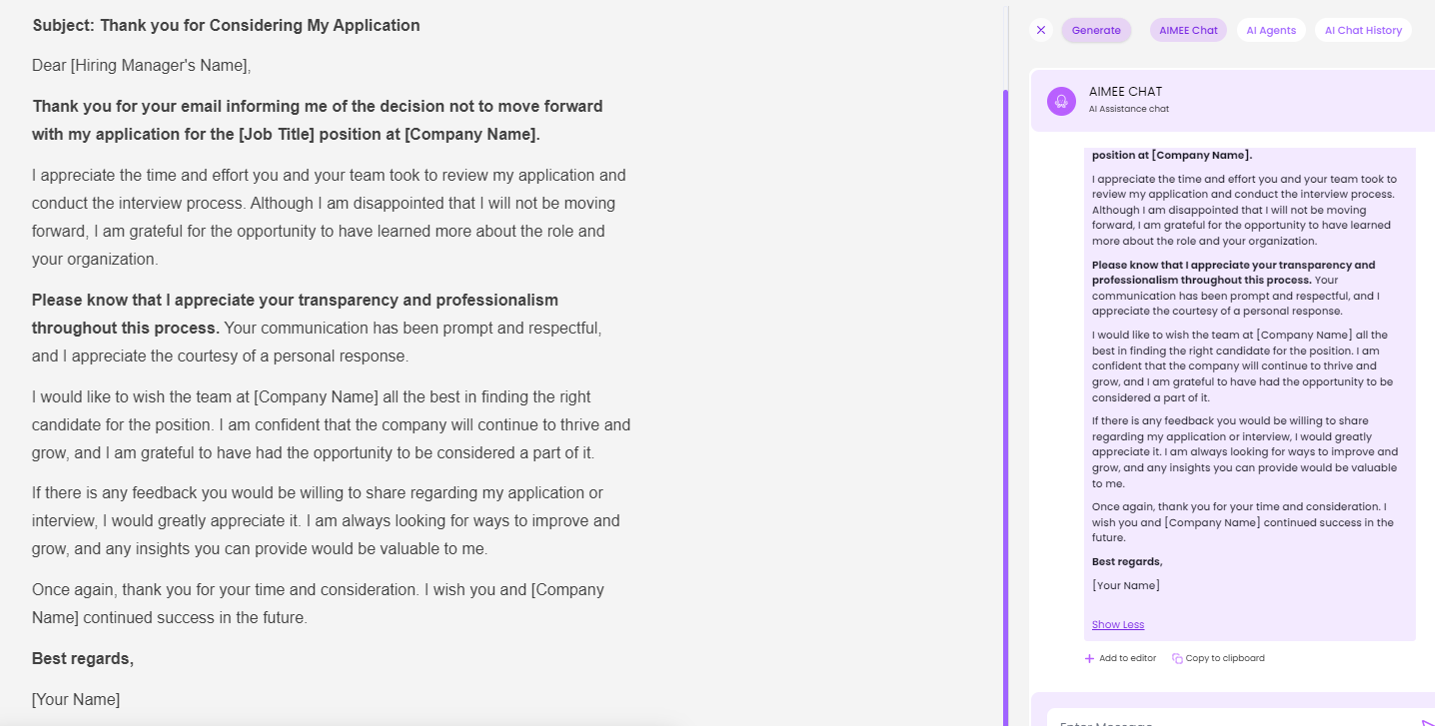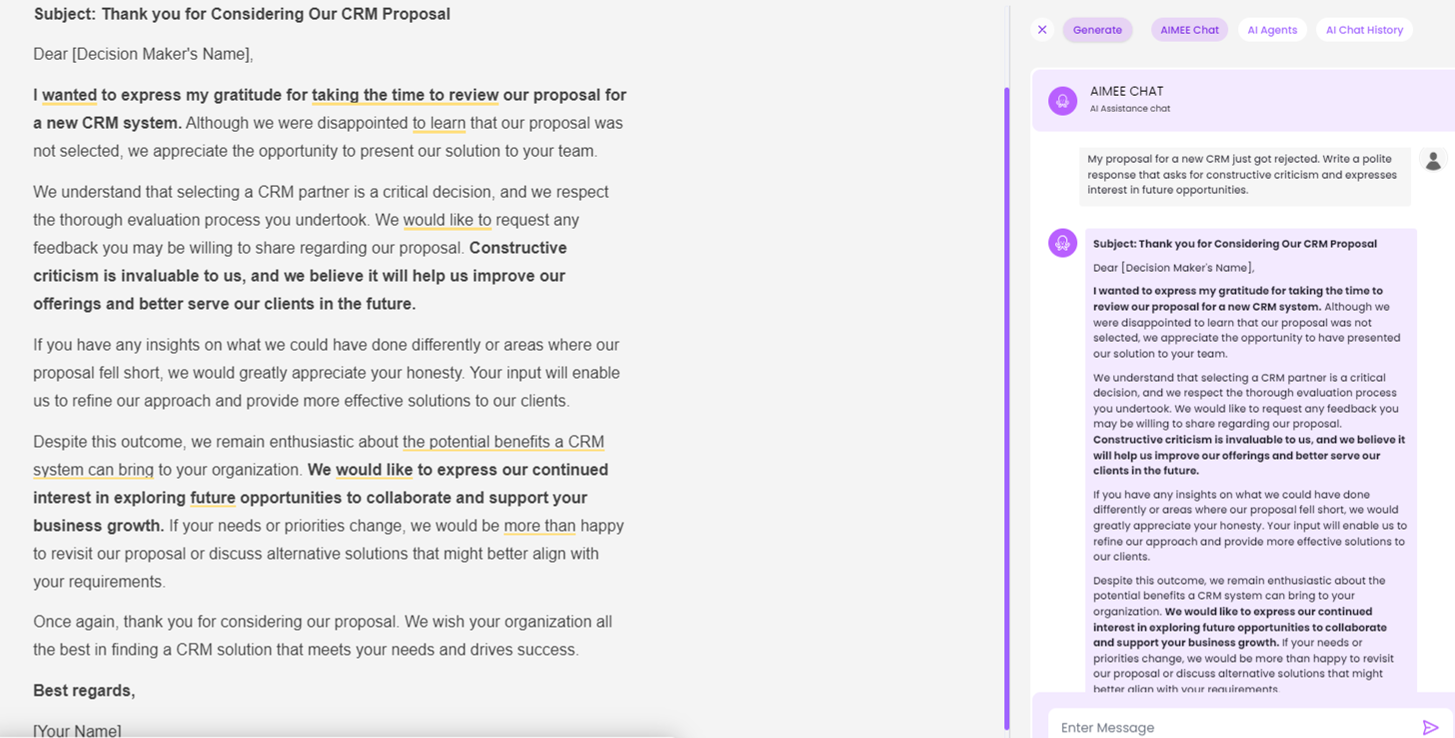You poured your heart into that job application or sales proposal and thought you had it in the bag. But then, the dreaded rejection email hits your inbox.
Ouch.
It stings, but don’t let it crush your spirit. Responding to a rejection email with poise can leave a lasting positive impression and even open doors down the road.
Receiving a rejection email can be disappointing, but your response is an opportunity to showcase your professionalism. The key is to strike the right chord – express your gratitude for being considered, be concise in your reply, and maintain an upbeat attitude.
We’ll share some tips on how to respond to a rejection email and move forward with grace.
Table Of Contents:
- How to Respond to a Job Rejection Email
- Crafting a Professional Response to a Job Rejection Email
- Job Rejection Email Response Template
- How to Respond to a Rejection Email in Sales
- Sales Rejection Email Response Template
- FAQs: How to Respond to a Rejection Email
- Conclusion
How to Respond to a Job Rejection Email
As a job seeker, receiving a rejection email can be tough. But here’s the thing – how you handle that rejection can make all the difference in your job search.
In my experience, the best way to respond to a job rejection letter is to keep it classy and professional.
Here’s what I recommend:
Acknowledge the Rejection
First things first, acknowledge the hiring decision. A simple “thank you for letting me know” will do.
This shows you respect their decision, even if it’s not the news you wanted.
Acknowledging a job rejection email with dignity reflects positively on you and leaves room for growth within one’s career path. It exemplifies maturity — a trait every employer seeks — and maintains good relations with potential employers where paths may cross again under different circumstances.
Thank Them for Their Time and Consideration
Let the hiring manager know how much you appreciate them taking a few minutes to go through your job application.
Acknowledging their time and effort can leave a lasting positive impression that sets you apart from other applicants.
Express Gratitude and Continued Interest
In your rejection email response, make sure to convey your appreciation for the chance to interview and learn about the company culture. Highlight how this hiring process has further solidified your desire to work there, despite the current outcome.
If you’re as enthusiastic as ever about joining the team, make sure they know it. Reiterate your strong interest in the company and convey your eagerness to be kept in mind for upcoming openings.
The perfect role for you could be just around the corner.
Request Feedback on Your Application or Interview
Lastly, don’t be afraid to ask for constructive criticism from the hiring manager. Politely request any feedback they can share on your application or interview. This shows you’re eager to learn and improve.
Plus, their insights could be game-changers for your job search.
The key is to keep your job rejection email response gracious and forward-thinking. With the right approach, that rejection email could open new doors.
Crafting a Professional Response to a Job Rejection Email
Crafting the perfect rejection response email is an art. You want to strike the right tone and leave a lasting positive impression.
Here are my top tips:
Keep The Email Concise And To The Point
No one wants to read a novel at work, especially hiring managers who have to go through hundreds of applications each day.
Keep your message brief and focused. Aim for a few concise paragraphs that get your key points across.
Maintain a Polite and Professional Tone
Even if you’re feeling disappointed, keep your tone courteous and professional. Remember, you might want to apply to this company again in the future.
Leave the door open by staying positive and gracious.
Personalize Your Email to The Specific Job and Company
Show the hiring manager that you were paying attention by personalizing your email.
Reference the specific job title and mention something you appreciated about the interview process.
Those personal touches make a difference.
Proofread Your Email Before Sending
Before hitting “send,” give your email a once-over for typos and grammar errors. A clean, mistake-free message conveys your professionalism and eye for detail, ensuring your words make the impact you intended.
At the end of the day, a thoughtful rejection response email keeps you in good standing with the company. You never know what future job opportunities might arise.
Job Rejection Email Response Template
To put these tips into practice, here is an adaptable template:
Hello [Name],
Thank you very much for letting me know about [Company]’s decision regarding my application.
Although I am disappointed not to be moving forward towards joining [Company] at this time, I sincerely appreciate having had the opportunity to learn more about [specific project/goal discussed during interviews], which excites me greatly.
I remain very interested in becoming part of such innovative efforts and would like to kindly ask that my details be kept on file should another position aligning with my skills become available.
Thank you once again for considering my application among many others. I hope we might have a chance to work together at some point down the line.
Wishing all the best of success going forward,
[Your Name]
This approach ensures maintaining positive relations while keeping communication lines open should new roles emerge fitting your skill set.
If you don’t want to use a generic template and prefer a 100% original email, you can use an AI tool like BrandWell to write your response.
Like this:

BrandWell will always generate original text so no two emails are the same. If you want to craft response emails that are 100% unique and customized to your recipient, this is the perfect tool for you.
How to Respond to a Rejection Email in Sales
Receiving a rejection email, whether it’s for a project proposal or after pitching your product, can be tough. However, how you respond to this rejection can set the stage for future opportunities and demonstrate your professionalism.
Crafting an effective response to a sales rejection letter requires careful consideration of several factors.
Carefully Review the Rejection Email
The first step is to carefully review the rejection email. Look beyond the disappointment of not closing the deal and try to understand any feedback provided about your sales pitch. This could offer valuable insights into areas where you might improve.
Maintain a Positive Tone
Your initial reaction might be one of frustration or discouragement, but these feelings mustn’t seep into your email response. Begin by expressing gratitude for the opportunity to submit your proposal and participate in their evaluation process.
A simple acknowledgment such as “Thank you for considering my proposal and providing me with feedback” sets a positive tone for your message.
Brevity Is Key
Keep your message concise yet meaningful; respect the decision-maker’s time while addressing all key points effectively.
Request Constructive Criticism
Gaining insight into why your sales proposal was rejected can provide valuable feedback for refining future proposals.
Politely ask if they would be willing to share any specific reasons behind their decision or areas where they felt other proposals excelled over yours. This request not only shows that you are eager to learn and improve but also keeps communication lines open with potential constructive criticism that could prove invaluable.
Express Interest in Future Opportunities
In addition to seeking feedback, let them know of your continued interest in working together on future projects by saying something like, “I remain very interested in finding ways we might work together moving forward.”
Highlighting alignment between their needs and what you offer reinforces the potential value you bring without sounding desperate or pushy.
Sales Rejection Email Response Template
Here’s a basic template for responding to a sales rejection email:
Dear [Recipient’s Name],
Thank you for getting back to us and for considering our proposal. While we’re naturally disappointed to hear that our offer didn’t meet your current needs, we appreciate your honesty and the opportunity to learn from your feedback.
Understanding that our proposal may not have aligned perfectly with your requirements, I wanted to take a moment to express our continued interest in working with you and exploring how we can better tailor our solutions to meet your specific needs.
Would you be open to a brief call or meeting where we can discuss in more detail the areas where our proposal fell short and explore potential adjustments or alternative solutions that might better suit your requirements?
Our goal is to ensure that we provide you with the best possible value and service, and your insights are invaluable in helping us achieve that goal.
Please let me know a convenient time for you, and I’ll be more than happy to arrange a discussion at your earliest convenience.
Thank you once again for considering our proposal, and I look forward to the possibility of working together in the future.
Best regards,
[Your Name]
[Your Position]
[Your Company]
[Your Contact Information]
Again, you can use BrandWell to write a tailored response to a sales rejection email. Here’s an example:

If you need help writing follow-up emails for sales, get your free follow-up email templates here.
FAQs: How to Respond to a Rejection Email
How do you politely respond to a rejection email?
Thank them for the chance and express your hope to stay in touch. It shows class and keeps doors open.
How do you respond to a rejection email acting?
Show appreciation for the opportunity, ask for feedback, and mention your interest in future roles. Stay positive throughout.
How do you respond when a candidate rejects an email?
Acknowledge their decision gracefully, wish them well on their journey, and leave the door open for potential future connections.
How do you respond to a rejection email for reconsideration?
Gently request they keep your file active for any upcoming roles that match your skills better. Thank them again.
Conclusion
Responding to a rejection email might feel like the last thing you want to do, but it’s a chance to showcase your professionalism and leave a positive final impression.
By thanking the hiring manager or procurement officer, expressing your continued interest, and requesting feedback, you’re not only handling the situation with class but also keeping the door open for future opportunities.
When faced with rejection, remember that it’s not a reflection of your value or skills. It’s simply a stepping stone towards the ideal position or deal you want to achieve.